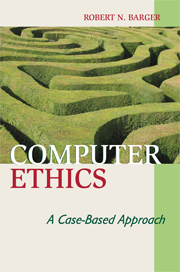Book contents
- Frontmatter
- Contents
- Preface
- Acknowledgments
- 1 Introduction
- 2 The Computer as a Humanizing Agent
- 3 Philosophic Belief Systems
- 4 A Philosophic Inventory
- 5 The Possibility of a Unifying Ethical Theory
- 6 The Ethical Decision-Making Process
- 7 Psychology and Computer Ethics
- 8 The Computing Field as a Profession
- 9 Computer-Related Codes of Ethics
- 10 Computer Ethics and International Development
- 11 Robotics and Ethics
- 12 Theft and Piracy Concerns
- 13 Cases Concerning Theft and Piracy
- 14 Privacy Concerns
- 15 Cases Concerning Privacy
- 16 Power Concerns
- 17 Cases Concerning Power
- 18 A Miscellaneous Collection of Cases
- 19 Parasitic Computing Case
- Appendix: Topics for Presentations, Discussions, and Papers
- Notes
- Selected Bibliography
- Index
1 - Introduction
Published online by Cambridge University Press: 05 June 2012
- Frontmatter
- Contents
- Preface
- Acknowledgments
- 1 Introduction
- 2 The Computer as a Humanizing Agent
- 3 Philosophic Belief Systems
- 4 A Philosophic Inventory
- 5 The Possibility of a Unifying Ethical Theory
- 6 The Ethical Decision-Making Process
- 7 Psychology and Computer Ethics
- 8 The Computing Field as a Profession
- 9 Computer-Related Codes of Ethics
- 10 Computer Ethics and International Development
- 11 Robotics and Ethics
- 12 Theft and Piracy Concerns
- 13 Cases Concerning Theft and Piracy
- 14 Privacy Concerns
- 15 Cases Concerning Privacy
- 16 Power Concerns
- 17 Cases Concerning Power
- 18 A Miscellaneous Collection of Cases
- 19 Parasitic Computing Case
- Appendix: Topics for Presentations, Discussions, and Papers
- Notes
- Selected Bibliography
- Index
Summary
A Brief History of Computers and the Internet
At the beginning of a study of computer ethics we need to have some understanding of how computing has developed in society. In one sense, computers have been around for a long time, and in another, they are a fairly recent phenomenon. Historically, the first computers were simply fingers and toes – digital computers in the literal sense. They were simple tools used for counting. As calculation became more complex, other tools began to be used to leverage the calculating load. This technology developed along the lines of sticks and stones, then the abacus about 1000 BCE in China, and finally the machines produced during the period of formal mechanics.
Like the railroad, mechanical computers were invented in the United Kingdom. The inventor of the first mechanical computer was Charles Babbage (1791–1871). In the early 1820s he began work on a model of a machine he called the Difference Engine. The purpose of this machine was to calculate numbers for use in mathematical tables. In the early 1830s he turned his attention to work on a programmable Analytical Engine, which was intended to use punched cards. This machine, like the Difference Engine, never went into production. Part of the problem was Babbage's continual rethinking of his plans for the engines. The other part of the problem was the lack of available tools that would produce materials of the tolerance that he required.
Information
- Type
- Chapter
- Information
- Computer EthicsA Case-based Approach, pp. 1 - 15Publisher: Cambridge University PressPrint publication year: 2008
